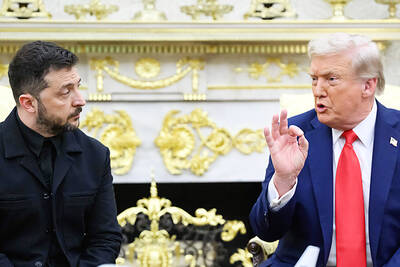The US government has declassified the fact it held nuclear weapons on Okinawa in Japan during the Cold War, though the matter had long been an open secret.
A US Department of Defense Web site states the Pentagon has declassified “the fact that US nuclear weapons were deployed on Okinawa prior to Okinawa’s reversion to Japan on May 15, 1972.”
The US National Security Archive at George Washington University welcomed the disclosure, but pointed to US Air Force photos depicting nuclear weapons on the island that have been publicly available for more than 25 years.
“However welcome the release may be, its significance is somewhat tempered by [that] astonishing fact,” the non-governmental research group said in a statement on Friday.
The group added that the US government had wasted an “inordinate” amount of time and resources by delaying the declassification.
Japan is the only nation to have been attacked with nuclear weapons. The US dropped atomic bombs on Hiroshima and Nagasaki in 1945, killing more than 210,000 people and leading to Japan’s surrender in World War II.
Japan has since campaigned to abolish the weapons. Former Japanese prime minister Eisaku Sato won the Nobel Peace Prize largely for his “three principles” — that Japan will not possess, produce or allow nuclear weapons on its soil.
Okinawa remained under US control until 1972 and many parts of the archipelago are still used for US bases.

Shamans in Peru on Monday gathered for an annual New Year’s ritual where they made predictions for the year to come, including illness for US President Donald Trump and the downfall of Venezuelan President Nicolas Maduro. “The United States should prepare itself because Donald Trump will fall seriously ill,” Juan de Dios Garcia proclaimed as he gathered with other shamans on a beach in southern Lima, dressed in traditional Andean ponchos and headdresses, and sprinkling flowers on the sand. The shamans carried large posters of world leaders, over which they crossed swords and burned incense, some of which they stomped on. In this

Near the entrance to the Panama Canal, a monument to China’s contributions to the interoceanic waterway was torn down on Saturday night by order of local authorities. The move comes as US President Donald Trump has made threats in the past few months to retake control of the canal, claiming Beijing has too much influence in its operations. In a surprising move that has been criticized by leaders in Panama and China, the mayor’s office of the locality of Arraijan ordered the demolition of the monument built in 2004 to symbolize friendship between the countries. The mayor’s office said in

‘TRUMP’S LONG GAME’: Minnesota Governor Tim Walz said that while fraud was a serious issue, the US president was politicizing it to defund programs for Minnesotans US President Donald Trump’s administration on Tuesday said it was auditing immigration cases involving US citizens of Somalian origin to detect fraud that could lead to denaturalization, or revocation of citizenship, while also announcing a freeze of childcare funds to Minnesota and demanding an audit of some daycare centers. “Under US law, if an individual procures citizenship on a fraudulent basis, that is grounds for denaturalization,” US Department of Homeland Security Assistant Secretary Tricia McLaughlin said in a statement. Denaturalization cases are rare and can take years. About 11 cases were pursued per year between 1990 and 2017, the Immigrant Legal Resource

‘RADICALLY DIFFERENT’: The Kremlin said no accord would be reached if the new deal with Kyiv’s input did not remain within the limits fixed by the US and Russia in August Ukrainian President Volodymyr Zelenskiy is to meet US President Donald Trump in Florida this weekend, but Russia on Friday accused him and his EU backers of seeking to “torpedo” a US-brokered plan to stop the fighting. Today’s meeting to discuss new peace proposals comes amidst Trump’s intensified efforts to broker an agreement on Europe’s worst conflict since World War II. The latest plan is a 20-point proposal that would freeze the war on its current front line, but open the door for Ukraine to pull back troops from the east, where demilitarized buffer zones could be created, according to details revealed by